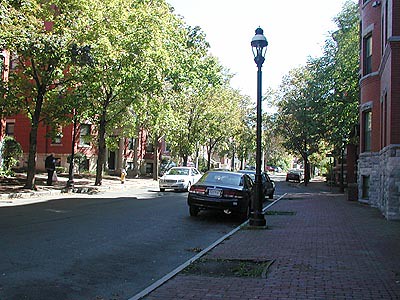 A letter to the editor in yesterday’s Republican mirrors some sentiments in an article by Maureen Turner in the latest issue of the Valley Advocate. Both address City Councilor Tim Rooke’s proposal to require permits for rental property owners, ensuring that such properties are up to date on their taxes and their compliance with city code. The matter was also touched on in the Republican last month.
A letter to the editor in yesterday’s Republican mirrors some sentiments in an article by Maureen Turner in the latest issue of the Valley Advocate. Both address City Councilor Tim Rooke’s proposal to require permits for rental property owners, ensuring that such properties are up to date on their taxes and their compliance with city code. The matter was also touched on in the Republican last month.
The letter to the editor, submitted by Al Joyce of East Longmeadow, suggests that such a city ordinance (Residential Rental Occupancy Permit) would be useless, and argues that the city already has processes in place to address the issues Rooke is pursuing. From his letter:
It is naive to think that property owners who don’t pay taxes and don’t maintain their property will bother to obtain a rental permit. However, the conscientious property owners, who are already maintaining their properties and paying their taxes, will be hurt by this proposal due to increased fees and longer vacancy times waiting for inspections. Something as simple as a burned-out light bulb can cause an inspection failure and cause a property to sit vacant while waiting for a re-inspection. The majority of tenants in Springfield are on programs that already require the property to pass a code inspection prior to occupancy.
There is already a method for dealing with owners who don’t pay taxes and don’t maintain their properties. The city can take the property for non-payment of taxes and the courts can even put you in jail for not maintaining your property.
Instead of adding new useless bureaucracy, the city of Springfield could improve the enforcement of its current housing laws and decrease the amount of time it waits before doing a tax taking.
Turner’s article questions, “Red Tape or Right Track?” and quotes Springfield realtor Kevin Sears:
“The concept is noble; the reality is awful,” says Sears, VP of government affairs for the Massachusetts Association of Realtors. As it is, Sears says, there aren’t enough city inspectors to check out properties in response to complaints: “This type of red tape would only make it worse.”
While the ordinance has the admirable goal of putting pressure on bad landlords, Sears says, in practice, “this kind of thing would only punish the good landlord and hurt the rental market,” including tenants, who would end up absorbing the cost of the permit in their rent. “We’re all in favor of code enforcement but it needs to be done properly,” says Sears, who would prefer to see the city continue its efforts to get problem landlords to Housing Court.

The article also lays out some of the details of the proposed ordinance:
[L]andlords would have to apply to the city’s Inspection Department for a permit. For places already being rented, temporary permits would be issued until an inspection could be done. A landlord who fails inspection would have 10 days either to submit a plan for addressing the problems that led to denial of the permit, or to appeal. Appeals would be heard by a three-member board appointed by the mayor.
The draft ordinance also gives the city the right to revoke a permit if a landlord knowingly rents to tenants who commit criminal acts on the property. Once a landlord gets an initial permit, the property would be re-inspected every two years, although there could be an earlier inspection if a tenant or neighbor complains about problems or a code official suspects violations. So far the ordinance does not include a fee for a rental permit, although Rooke acknowledges that one might be added.
Rooke is optimistic that the ordinance, which already has the backing of the Chamber of Commerce, will pass. While it might initially take several years—and the hiring of new inspectors—to get all the city’s units inspected, Rooke says, he adds that it’s worth the effort.
The ordinance proposal appears to connect with a recommendation from a national Urban Land Institute panel to “educate and regulate landlords through licensing.” The reactions above expressing displeasure with the ordinance proposal, advocating for more rigorous code enforcement, also mesh with ULI recommendations. From their report (PDF) released in March, on the subject of licensing rental properties (page 39):
The city could also use licensing of rental properties to give another form of control over the rental stock and to raise funds to cover both code enforcement and landlord-tenant mediation. These fees do not have to be large, but even an annual $25 fee can raise significant funds. By requiring a license, the city can maintain a list of landlords and send out materials, such as information on lead paint and sample leases that comply with local laws. In cases where the property is poorly maintained and the landlord is not taking corrective action, the city can revoke the license. This tool can be very effective.
And on the subject of landlord training (page 38), the report uses the metaphor of the carrot and the stick. The carrot:
[Landlord] training can be done in a series of evening meetings where speakers discuss the laws, the procedures in the court system, tenant selection, building maintenance, and so on. Rehabilitation loans can be funded by community development block grant (CDBG) or HOME funds from the US Department of Housing and Urban Development, sometimes with a few units restricted to affordable/workforce households to provide mixed-income buildings.
And the stick:
?more thorough and frequent code enforcement, entering into consent agreements with landlors on repairs. If repairs are not completed as agreed to, follow-up is required and landlords can be fined, or in severe cases, sent to jail. This remedy should be applied only in the worst cases or send the message that the city is serious about landlords who disregard the laws, tenants, and neighbors.
If Councilor Rooke got his idea for licensing from the ULI report, that connection hasn’t been made highly evident. If the ideas in the report are similar to what he’s proposing, he might do very well to refer to the report’s recommendations for backup and building up some consensus around this idea. For it to be dismissed as more red tape, without fair consideration, could potentially do a disservice to the community, especially if the idea is maybe worth implementing.
And isn’t it also true that we can apply more than one strategy at once? Does a rental occupancy permit have to negate our efforts to improve code enforcement? Additional funding for that very code enforcement is a component of the ULI’s suggestion to charge a small fee for the permit.


